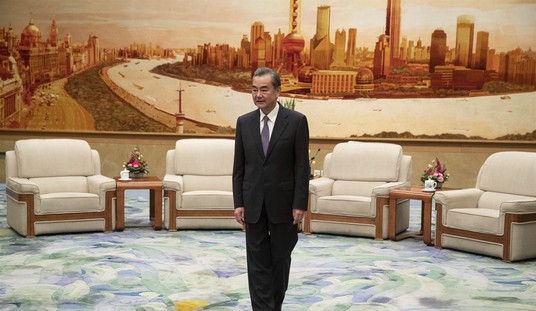Fifteen days after the first cease-fire agreement from the peace talks in Minsk, the belligerents in the Ukrainian civil war have agreed to push forces back even farther from each other in an attempt to actually stop fighting. Despite the earlier cease fire, the proximity of forces — and the presence of Russians within the rebel forces — kept the war in action, complete with artillery fire and air combat. The new agreement will create a 19-mile buffer zone to push forces out of artillery range in the hope that this will avoid more clashes:
Negotiators in Ukrainian peace talks agreed early Saturday to create a buffer zone to separate government troops and pro-Russian militants and withdraw heavy weapons and foreign fighters in order to ensure a stable truce in eastern Ukraine.
The deal reached by representatives of Ukraine, Russia, the Moscow-backed rebels and the Organization for Security and Cooperation in Europe marks an effort to add substance to a cease-fire agreement that was signed on Sept. 5 but has been frequently broken by clashes.
The memorandum signed after hours of talks that dragged late into the night says that the conflicting parties should stay strictly where they were Friday and make no attempts to advance.
OCSE will put monitors in place to confirm the withdrawals. That will be a neat trick for OCSE, which has remained committed to policing the conflict despite having had its monitors abducted by the rebels over the last few months. They still have no real way to stop either side from violating this agreement, just as both sides are violating the current one. The only action OCSE can take would be to highlight the buffer-zone encroachments before they prompt fighting, and it’s doubtful that OCSE will have enough resources to patrol the entire area continuously.
Despite the push for a cease-fire, neither side has strong motivations to stop fighting. Kyiv wants to reassert its full sovereignty over the region, and the Russian-backed separatists want nothing to do with Kyiv — and their Russian sponsors want to annex the region along with Crimea. Only the international scrutiny being applied to the conflict has dimmed the ambition of the latter, and only the ramp-up of Russian military assistance to the rebels has stalled Kyiv on finishing the job.
The Russians may also be worried that the West will start taking a more direct role in supporting Kyiv:
Ukrainian President Petro Poroshenko returned from a visit to the U.S. two days ago without a pledge of weapons to fight the insurgents. While securing no lethal aid, Poroshenko got a $53 million package of economic and military assistance from the U.S. during a trip that included a meeting with PresidentBarack Obama and an address to Congress. …
In a sign of further international assistance, the defense ministers of Poland and Lithuania, two former Soviet-bloc countries that are now in NATO, signed an agreement yesterday with their Ukrainian counterpart about forming a mixed brigade. The unit will be deployable on United Nations peacekeeping missions.
“The way to contain Russia is to stay tough and keep them unsure that they can impose their will,” Polish President Bronislaw Komorowski said yesterday at a conference in Bialystok, Poland. “No actions should be taken toward Russia that could be interpreted as rewarding aggression.”
The balance of bad outcomes may really mean that the war is coming to an end, writes Reuters’ Anatole Kaletsky:
Investors have mostly assumed that the ceasefire would not hold, either because Russian President Vladimir Putin is deceitful and greedy for more territorial conquest, or because Ukraine’s President Petro Poroshenko would not accept the splintering of his country that Russia demands. But this fashionable pessimism is probably wrong.
The ceasefire no longer relies on good faith or benevolence but on a convergence of interests: Putin has achieved all his key objectives, and Poroshenko recognizes that trying to reverse militarily the Russian gains would be national suicide.
Admittedly, there is still a “party of war” in Kiev, seemingly led by Prime Minister Arsenyi Yatsenyuk,who has called on the North Atlantic Treaty Organization to back his country in an all-out war with Russia. But this week’s vote in the Ukrainian Parliament on temporary autonomy for the rebel regions suggests that most of the country’s politicians have abandoned hope of winning a war with Russia. They also understood that Western military assistance is not coming.
This may sound like a grimly defeatist analysis. Yet a modest victory for Russia was actually the least bad outcome to be expected — given that there was never any chance of economic sanctions stopping Putin, for reasons explained here in March.
“Fashionable pessimism” still sounds more rational in this situation. This is nothing more than a diplomatic version of trench warfare from a century ago, and a pause in an unresolved conflict. If Kyiv is willing to kiss the Donbas goodbye altogether, then perhaps there will be little reason to fight. That would be a major defeat for the new government in Kyiv, even if they have no real way to enforce their sovereignty in the face of a threatened Russian invasion and no hope of military allies to resist it. At best, we’ll be looking at stalemate in the Donbas for a generation, unless Vladimir Putin leaves and a less-imperialist ruler takes his place. Until then, it looks like OCSE monitors have long-term job security.









Join the conversation as a VIP Member